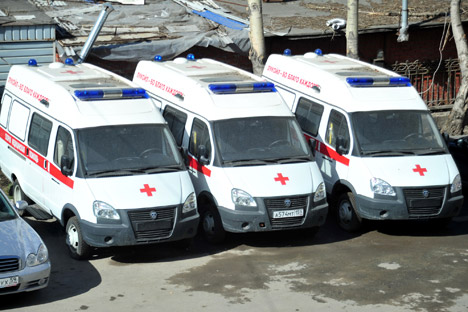
Perm becomes ambulance outsourcing pioneer. Source: Press Photo
Russian ambulances are anything but quick in arriving. The Health Ministry's standards require an emergency vehicle to reach its patient in 20 minutes; this rule equally applies to urban and rural areas. In reality, however, this 20-minute cap is almost always missed: According to popular feedback, average waiting times vary between 40 minutes and 1.5 hours.
One reason for this is a shortage of roadworthy ambulances. Businessman Yevgeny Fridman estimates the Russian ambulance fleet to be at around 15,000 vehicles. This is not enough as it is, and around 60-80 percent of the vehicles are run down.

Yevgeny Fridman: "Any innovations are invariably treated with suspicion in this country". Source: Press Photo
"Regional administrations have no budgets to replace all their old ambulances in one go, so our business model is their only chance for a quick solution," he says. Back in 2007, Fridman offered the mayor's office of Perm, his native town, to take care of the city's ambulance fleet problem for a reasonable price.
Let the doctors concentrate on their patients, he proposed, and we will supply them with new vehicles and provide associated maintenance services. The businessman had prior experience in the transportation sector, as his company was running a shuttle bus service in
However, the city baulked at the idea. Fridman would later encounter this same reaction numerous times when promoting his business model in other Russian regions. Everything changed in several months' time, when Perm authorities themselves approached him.
According to RosBusinessConsulting Group, the outsourcing of Perm's ambulance services saves around 5 million rubles ($155,000) per year. Fridman initially invested 3 million rubles (slightly over $115,000 at the 2007 exchange rate). In 2012, his ambulance business turned 100 million rubles (slightly over $3 million) at 15 percent profitability.
The governor had launched a daring healthcare reform in Perm Territory, commercializing hospitals and out-patient clinics and putting individual aspects of medical care up for bid. Fridman's ambulance outsourcing scheme fit in nicely with this experiment.
At the time, the businessman had a very vague idea of how healthcare outsourcing worked; he was mainly guided by the experience of Western countries. Fridman's initial experiment was with the city's out-patient clinics: His company invested 3 million rubles ($100,000) in its first five ambulance vehicles.
In 2008, with an ambulance fleet of around 100 units, Fridman took the risk of signing contracts with two emergency rooms, to provide them with 25 Fiat Ducato vans.
Hard to blaze a trail
"Any innovations are invariably treated with suspicion in this country," Fridman says. "We ran into problems immediately. First, there was the resistance of the medical community, even though hospital administrators supported our idea. We had to specially address the resistance of hospital drivers, many of whom had ingrained Soviet-era habits of siphoning off company gasoline or taking vehicle spares home at the end of the day. Plus, our scheme was going to make their working schedule busier."
Russian authorities plan to cut health spending in 2013
In parallel with evolving the ambulance business in Perm, Fridman began promoting his business model in other Russian regions. Local authorities would nod approvingly but ask him to call later.
"The only city that approached us in 2012 was Ufa," says Fridman. "We currently service one emergency room there and are planning to add three more. We launched successfully in Kirov this year and already have two rivals in the local market. We flopped in Volgograd, though, owing to an internal power struggle. The Volgograd region governor had meant to score points by touting our project as his own idea, but [his political] rivals launched a media war and intimidated residents with stories that we would not just be leasing out ambulances but would privatize the entire emergency medical service."
Perm becomes outsourcing pioneer
Fridman's example has caught on. There are at least four other companies in Perm offering ambulance vehicles for rent. The benefits of this business are evident: All the vehicles are new and are kept roadworthy at all times. They also reach patients faster than before.
"None of our vehicles is ever unavailable because it is unserviceable or undergoing a roadworthiness test," Fridman says. "We replace all our ambulances after a maximum of five years of service."
Competition on the market keeps the prices down. Ambulance outsourcing has also sprouted up in other Russian regions. Fridman says many municipal clinics do little more than treat patients nowadays.
Everything else, including laundry and catering, gets outsourced to the small business sector. Around 10 companies operate on the market. The next big dream of Fridman and his partners is to launch an outsourcing business in general aviation.
Early taste for entrepreneurship
Yevgeny Fridman's mother was a doctor; he has a medical degree himself. But his first taste for business came while still at school.
"My father and I went vacationing to a health resort, and he saw this casting ad for a children's movie," says Fridman, recollecting. "I showed up, they cast me and gave me a school uniform to wear for the shooting. I essentially played myself and got paid 25 rubles for that — an enormous sum of money in those times. I used it to buy new clothes and footwear and even had some money left afterwards. Perhaps this experience gave me some sort of psychological trauma: I became excessively independent. When I returned to school, I went on to seek opportunities to earn money—mending mops for a fee or working as caretaker at a local stadium in my free time."
Fridman's first serious business experience happened in his teens. At 17, he and his friends started selling cell phones. "There was no cell phone market as such in those days: People would go abroad to buy up phones and then sell them back in Russia," he says.
Shuttle trips like these were the most accessible and widespread business model in mid-1990s Russia. The money earned from this venture propelled Fridman to a new level: He started opening cell phone shops. At 21, Fridman and his team decided to sell their business and start a shuttle bus operation. Thus began the story of Perm's transport revolution.
All rights reserved by Rossiyskaya Gazeta.
Subscribe
to our newsletter!
Get the week's best stories straight to your inbox